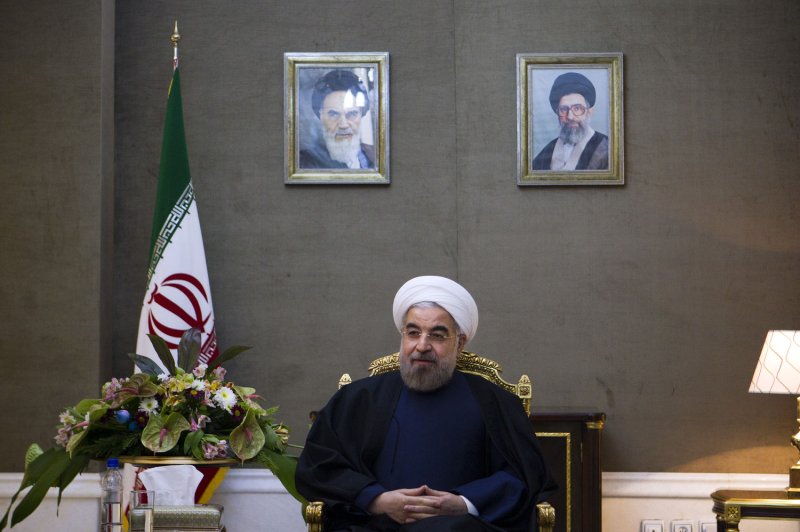Iranian president Hassan Rouhani speaks with United Arab Emirates Foreign Minister Abdullah bin Zayed (Not Pictured) during their official meeting at the Presidential Palace in Tehran, Iran on November 28, 2013. UPI/Maryam Rahmanian |
License Photo
WASHINGTON, Dec. 2 (UPI) -- The White House says new sanctions being crafted on Capitol Hill may split Washington from its partners, while a key lawmaker calls them an "insurance policy."
"If you want to hold our feet to the fire on the final deal, fine, do that," a senior administration official told The Washington Post.
"If people have concerns about elements of a final agreement, come in and tell us. ... But that is a separate discussion from passing a sanctions bill in the middle of negotiations," the official said.
The administration says new sanctions legislation could dismantle the Nov. 23 interim nuclear deal with Iran and derail permanent-deal talks planned for the next six months to ensure Iran can never build a nuclear weapon.
The administration also says the sanctions could create discord between the United States and the five other world powers negotiating with Iran and strengthen Iran's anti-Western hard-liners.
The five other world powers are Britain, France, Russia, China and Germany. Those countries, along with the United States, are the five permanent U.N. Security Council members plus Germany, known as the P5-plus-1.
"The purpose of sanctions from the outset was to create a dynamic so that you can get a change in policy from the Iranians," David Cohen, treasury undersecretary for terrorism and financial intelligence, told the Post.
"It's not sanctions for the sake of having sanctions," he said.
Cohen is responsible for enforcing economic sanctions against rogue nations and combating the financial support of the proliferation of weapons of mass destruction.
Senate Foreign Relations Committee Chairman Robert Menendez, D-N.J., a leading proponent of new sanctions, told CBS' "Face the Nation" he considered the Capitol Hill moves to create new sanctions "a very responsible position," noting they would take effect only if the talks toward a final agreement on Tehran's nuclear program fail.
"I think creating a sanctions [regimen] that is an insurance policy and also creates leverage for us is incredibly important," he told the program.
"Obviously diplomacy is something we want to see work. But we need to be ready to move forward."
The six-month interim deal reached in Geneva, Switzerland, calls for Iran to halt production of near-weapons grade nuclear fuel in exchange for some relief from economic sanctions amounting to $6 billion to $7 billion.
Supporters say the deal gives the International Atomic Energy Agency, reporting to the U.N. Security Council, unparalleled access to Iran's enrichment and reactor facilities, and forces Tehran to deactivate all its medium-enriched uranium, which could be converted into bomb fuel.
Iran insists its nuclear program is strictly for production of peaceful energy and medical research.
Critics of the deal say Iran already is too close to making a bomb and the agreement doesn't force it to dismantle any nuclear facilities.
"I'm very concerned, especially with this interim deal, how we get to a place where Iran is not enriching constantly or where they're right on the verge, always, of being able to break out and create a nuclear weapon," Sen. Bob Corker of Tennessee, the top Republican on the Foreign Relations Committee, told "Face the Nation."
"I have strong concerns about the proliferation that's going to occur in the area as people see this rogue nation being dealt with in this manner and basically us validating them over the next six months."
After the House passed a new sanctions bill this past summer, 76 of 100 senators, including key Democrats, urged President Barack Obama in a letter to take tougher action against Iran.
The Senate returns from its Thanksgiving break in a week.















